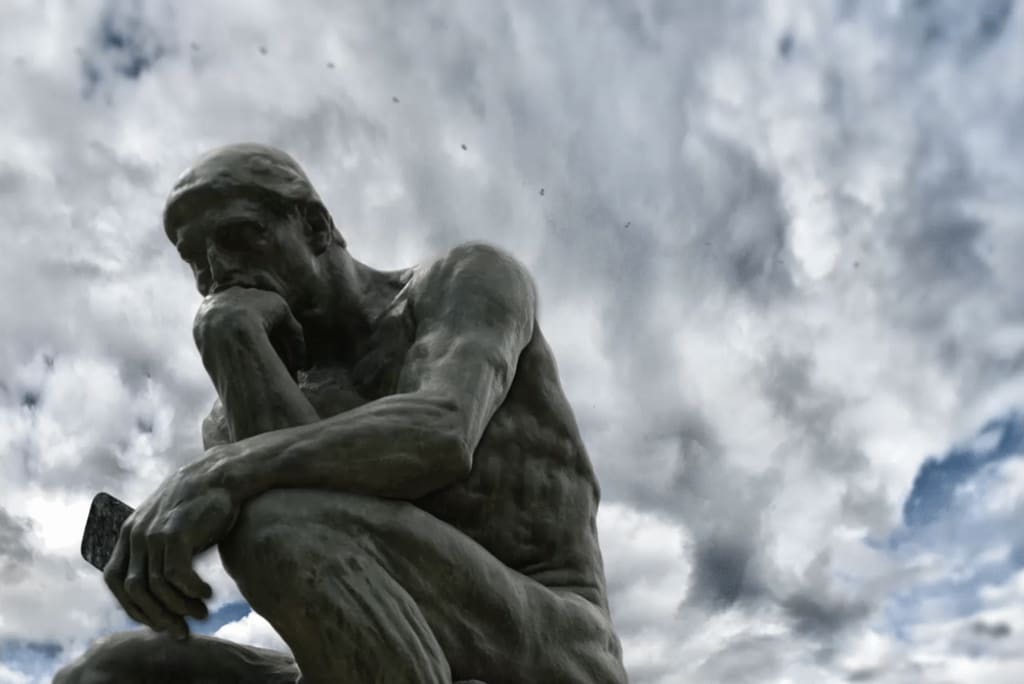Comparison: Unfounded and Paradoxical
Exposing the paradoxes in your double-tapping

We all know social media sucks sometimes.
No matter which "bright side" you've found in the magnitude of the internet, be it immediacy of connection and information, educational resources, or friendships, the internet and social media have polarized the world's societies, misinformed the masses, and changed human behavior forever by means of manufactured FOMO.
To understand the purposeful engineering of social media's chokehold, I suggest watching "The Social Dilemma" released recently on Netflix. Former top employees from companies like Facebook, Google, and Pinterest, share their regrets and fears in regard to the progression of the technologies they've created to hold their users captive, as the users are the actual product being sold.
But, I digress.
The "bummer" side effect we'll focus on is the overwhelming attack of this software on our mental and emotional stability. Note: this article isn't meant to address the "toxicity" of social media, but to help combat the quicksand of self loathing caused by the false perfection on your Instagram feed.
Just the other day I was talking to one of my dearest friends about scrolling for what seemed like miles through marriage proposals, baby showers, blissful travel, and lives of glamour, even during a national pandemic. Why were we so overwhelmed with the successes and joys of other people, driven even to a state of near panic?
The issue, of course, is comparison.
The second highest tier of Maslow's Hierarchy of Needs is esteem; comparison derives from our original human needs to delegate tasks to the most capable among a community to survive: the biggest and strongest should hunt, the most agile fingers gather, etc. Currently, socially derived self worth is less dependent on comparison of a person's social necessity in terms of skill, but of ability to demonstrate (possession of) our evolved social values: wealth, charity, beauty, leisure, popularity. If you can't show you have these, something must be wrong with you, right?
Hear me out: there aren't many things philosophy can't help you rethink (or distract you from).
Meet Zeno of Elea , a philosopher born roughly in 490 BC. In this magical time before Facebook ruined democracy, this one man challenged our understanding of time, space, and the concepts of infinity hundreds of years before infinity had its name. Although his original writings don't survive, his work is referenced in writings by no-names like Aristotle and Plato.
(If you've had a teacher demonstrate how halving a sum over and over never amounts to the full sum, you've encountered Zeno before. If not, that's fine. We won't encounter that particular paradox on this journey anyhow.)
Sounds crazy, but we are going to elect Zeno's Paradoxes of plurality as opponent to the throes of social comparison.
Here's what we'll come away with:
1. An opportunity to exercise logical muscles that only strengthen in contact with contradiction. Zeno, inventor of dialectic, will teach us to see reasoning as embracing truths that negate each other.
2. We'll have a cool conversation starter in any given room (full of fellow nerds)
3. Finally, we'll be confused. (Maybe even fatigued.)
The third is most important. When I am done scrolling through my timeline of happy faces and beautiful places, I am sure everyone is having a better time than I am. I know for a fact I'd rather trade my current seat on my couch for that woman's spot on the beach, or my boring job for that woman's fulfilling career, or my melancholy for their carefree, confident, joy. The goal is to be unsure of that jealousy and equally skeptical of how much we're missing out on.
Enough introduction, my goodness. Zeno's first paradox of plurality:
2.1 The Argument from Denseness
If there are many, they must be as many as they are and neither more nor less than that. But if they are as many as they are, they would be limited. If there are many, things that are are unlimited. For there are always others between the things that are, and again others between those, and so the things that are are unlimited. (Simplicius(a) On Aristotle’s Physics, 140.29)
Let's use a range of numbers to start. Let's say a function has a range from 1-9. There are nine "whole numbers" in between these values. We are also aware that there are an infinite number of values in this range, as numbers are infinitely divisible. If in between numbers 1 and 2 there is only one whole unit while also an infinite number of values, the numbers themselves, though they are fixed amounts, are also infinite. Each fraction is itself a whole value, just as each multiple is a whole value, each infinitely large and small.
Let's apply this thinking to musical notes. Imagine our human capacity to hear notes. Yes, I might be able to tell you which note you are singing, as there are eight in an octave. I might even be able to tell you that you are sharp or flat. But, how sharp? How flat? By the logic of plurality, I imagine an infinite number of sounds between each "note," each an individual mark somewhere on a scale between our major and minor notes.
Okay! Now about social comparison. Apply the paradox of "many" as both a fixed and unlimited amount of shared experience with and separate from the experiences of the person sunbathing on your tiny screen.
E.g. You scroll down your feed and see happy people. You are not: you are unhappy. But emotions, too, are many. There are both happy and unhappy. BUT, between these two individual feelings are infinite others. Knowing that you cannot quantify the complexity of their emotion, its distance from your own presumed feeling of incompleteness, or what fraction of happiness they might embody, you have no concrete comparison. You have no basis of comparison because you will not be sure whether you are infinitely small versions of the same state of being, or if you are in separate states with infinitely small complexities that you cannot accurately calculate. The answer is both. With no means of measurement.
By my reasoning, you and the person on your screen are both happy and sad, content and dissatisfied, bitter and sweet, to infinitely different and similar degrees. There's nothing of measurable value to envy.
You feel better already, don't you? :)
Let's plug along. The second paradox:
2.2 The Argument from Finite Size
… if it should be added to something else that exists, it would not make it any bigger. For if it were of no size and was added, it cannot increase in size. And so it follows immediately that what is added is nothing. But if when it is subtracted, the other thing is no smaller, nor is it increased when it is added, clearly the thing being added or subtracted is nothing. (Simplicius(a) On Aristotle’s Physics,139.9)
But if it exists, each thing must have some size and thickness, and part of it must be apart from the rest. And the same reasoning holds concerning the part that is in front. For that too will have size and part of it will be in front. Now it is the same thing to say this once and to keep saying it forever. For no such part of it will be last, nor will there be one part not related to another. Therefore, if there are many things, they must be both small and large; so small as not to have size, but so large as to be unlimited. (Simplicius(a) On Aristotle’s Physics, 141.2)
To be of any size, a thing must also divisible by another thing of size: this creates an infinite sort of expansion. But, for the size to be fixed, that one something that contains those expanding pieces must have pieces that expand to add no value. The expansion of these pieces must not alter the fixed size. Each something of size is the addition of objects of value, each infinitely divisible, and the rest so small they add no size at all. Things contain things of value and no value.
Therefore, if the thing is of value, it will expand under inspection.
What great meaning in your life can a social media post by a peer truly hold? Of all things you are made aware of in your day, what expansive truths can a staged image of false perfection hold? Rather than applying this paradox passively - instead of waiting for meaning to unfold itself from each piece of media you ingest each day - take charge! We'll decide what has meaning.
You most likely scroll through hundreds of pieces of "information" per day. Those "hundreds" are made of things that matter and things that don't, both individually and all together. You decide which is which.
Two examples- the first is seeing all media as the value with pieces to analyze, the second applies the principle to a breakdown of a single post:
1. Your cousin's girlfriend posts a picture of herself on vacation! You've scrolled through your feed for a long time today and seen information about politics, educational materials about something you love to do, found recipes for something you want to make later, etc. Why stop to be jealous of or enamored with her post when, in the larger scheme of things, you can decide it holds no value in comparison to the rest? See, let comparison work to your advantage.
2. Your high school crush got engaged! The parts that matter might be how happy you are for them, how proud you are of their growth, and how lucky you feel to be made a part of the celebration. The parts that don't matter are how behind in life you feel, or how much you wish you'd dated that person in high school, as their circumstance has nothing to do with you and also in high school you had a lisp from your braces and had no sense of style so do you really want to relive that? (That last part was just me cracking myself up.)
Anyway, actively steering the "does it really matter" wheel can help us have such a good day.
Third paradox:
2.3 The Argument from Complete Divisibility
… whenever a body is by nature divisible through and through, whether by bisection, or generally by any method whatever, nothing impossible will have resulted if it has actually been divided … though perhaps nobody in fact could so divide it.
What then will remain? A magnitude? No: that is impossible, since then there will be something not divided, whereas ex hypothesi the body was divisible through and through. But if it be admitted that neither a body nor a magnitude will remain … the body will either consist of points (and its constituents will be without magnitude) or it will be absolutely nothing. If the latter, then it might both come-to-be out of nothing and exist as a composite of nothing; and thus presumably the whole body will be nothing but an appearance. But if it consists of points, it will not possess any magnitude. (Aristotle On Generation and Corruption, 316a19)
(Revisit that third goal of studying these paradoxes. ;) Because, WHAT?)
Okay, simplified: This argument states that any "body" is just pieces taking the visual shape of a body. If the body is divisible "through and through," or from any point all the way through to any other point, this creates an unlimited number of divisions; so too, unlimited possible points of entry imply preexisting gaps in the body. These gaps, rather, are still points that belong to the body, though having no magnitude. The body, if divisible through and through, having potential points of entry everywhere, must be a collection of pieces, each of no magnitude.
No matter how unfounded this last paradox seems to be, lets modify it to suit our needs.
Let's decide that the divisibility and points of bisection that Zeno suggests expose a body to be no more than an image composed of insubstantial points, in regard to the social media posts that make us feel wholly inadequate, envious, or inferior, are instead cracks in the fabricated reality, and accidental proof of illusion.
I'll explain. If you can tell something is fake about the post, nothing about it is real (enough to matter to you). Examples:
- If there is a person posing in the photo, it was staged, correct?
- If the picture seems to differ from the standard dimensional orientation, it seems to have been cropped, no?
- If the hint of sepia tone doesn't seem to fit the setting, might it be caused by a filter? Uh oh!
- Are parts blurred? (Is there *gasp* evidence of Facetune?)
- If there are multiple shots in the post, each of the same subject but at different angles, does that not suggest the "poster" chose the best of many attempts at flattery, also suggesting there were less favorable shots? Bye bye, envy!
These points of dissection render the rest of each image, video, etc. unnatural and unreal. Double tap and move on.
If you think about it, every post you see on the internet has the same dissection point: it was produced, tweaked, and posted solely to engage and impress you. Of all the pictures taken on someone's phone, a social media page is constructed and curated to capture best moments, embody a theme, or to further a personal brand. Even the posts where a friend is crying their eyes out or venting about hardship are meant to show you how raw and vulnerable they can be, hoping for your support. Posts about community service are meant to show laudable acts of charity. Posts that seem indie and random are a demonstration of kooky likability, uniqueness, individuality, and weird charm. Pictures of landscapes, sunsets, or animals can capture someone's love for nature, or sometimes even a conscious effort to stand out.
Heck, some people are just sharing their worlds with their friends. Either way, this should have no impact on the way you feel you should be living your life.
If you are a good person, continue to be. There are always positive effects of online pressure, and you can be swept up in an effort to be an even more authentic agent of good in the universe. That's beautiful and I'm all for it. Be wary, though, of devaluing yourself in an imaginary competition with your online community's most beautiful, perfect, Instagrammable moments.
Zeno of Elea just wants you to love yourself. So do I. (And, I recommend ditching all of it for Pinterest.)






Comments
There are no comments for this story
Be the first to respond and start the conversation.